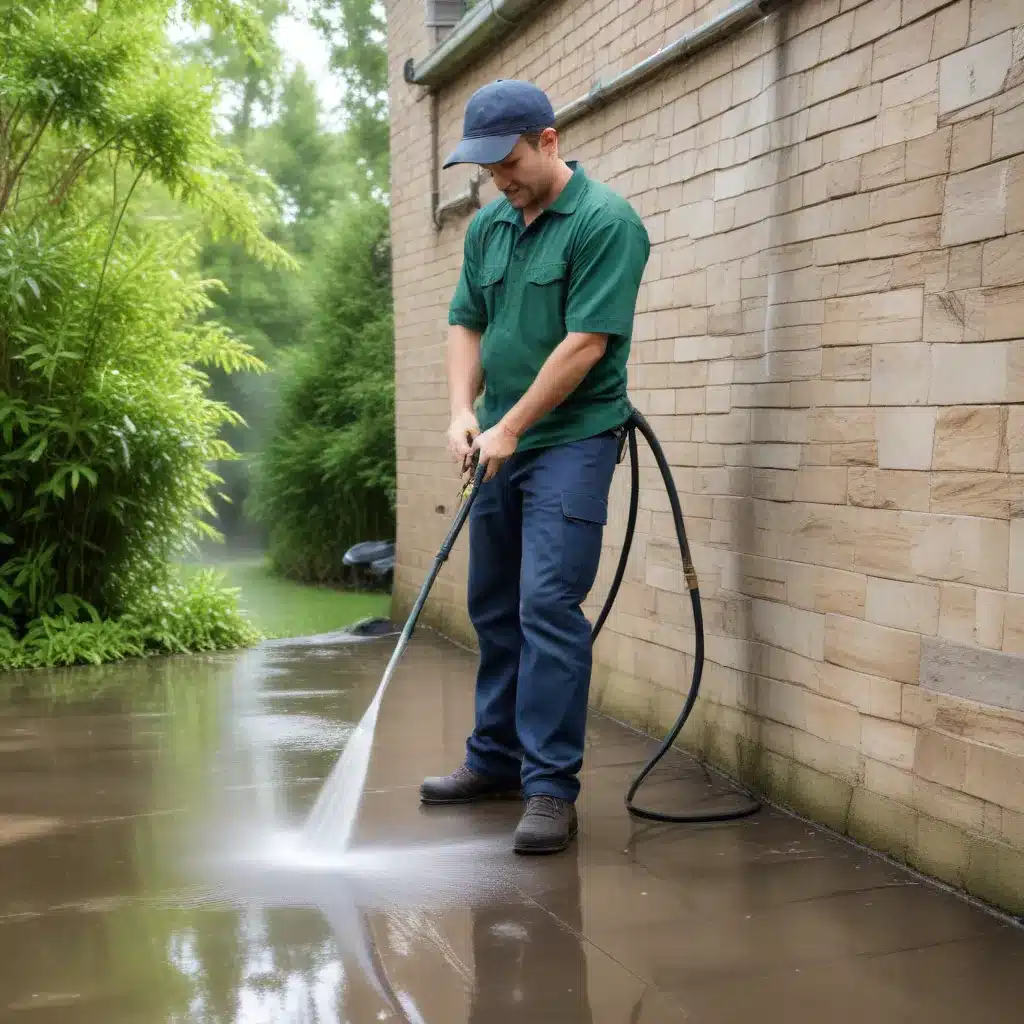
Understanding Pressure Washing Regulations in St. Louis
In the city of St. Louis, Missouri, pressure washing services are subject to a range of regulations and guidelines aimed at protecting the local environment. These rules are put in place to ensure that the wastewater and debris generated during pressure washing activities do not pollute the city’s storm drains, waterways, or soil.
One of the key regulations in St. Louis is the requirement to prevent the discharge of any pressure washing wastewater into storm drains. This includes water containing detergents, chemicals, or other contaminants. Pressure washing companies must take steps to capture and properly dispose of all wastewater generated during the cleaning process. This can be achieved through the use of vacuum systems, containment berms, or other mechanisms that prevent the water from reaching the storm drain system.
Additionally, pressure washing service providers in St. Louis must adhere to guidelines regarding the use of cleaning products. The city recommends the use of biodegradable, non-toxic, and phosphate-free detergents whenever possible. These eco-friendly cleaning agents minimize the environmental impact of pressure washing activities. It is also important to avoid the use of harsh chemicals that could harm local ecosystems if they enter the water or soil.
Eco-Friendly Pressure Washing Techniques
To comply with St. Louis’s environmental regulations and promote sustainable practices, pressure washing companies and property owners should consider adopting the following techniques:
Low-Pressure Washing
Low-pressure washing, typically between 500-1,500 PSI, can be an effective and eco-friendly alternative to traditional high-pressure washing. This method uses less water and reduces the risk of damage to the surface being cleaned, making it a suitable choice for delicate materials such as wood, siding, or painted surfaces.
Water Reclamation Systems
Investing in water reclamation systems can significantly reduce the amount of water consumed during pressure washing. These systems capture, filter, and recycle the wastewater, allowing it to be reused for subsequent cleaning cycles. This not only conserves natural resources but also minimizes the disposal of contaminated water.
Biodegradable Cleaning Products
The use of biodegradable, non-toxic cleaning products is essential for eco-friendly pressure washing. These products are formulated to be gentle on the environment, minimizing the risk of harm to local ecosystems. When selecting cleaning agents, look for products that are plant-based, phosphate-free, and have a low volatile organic compound (VOC) content.
Proper Disposal of Wastewater
Ensuring the proper disposal of wastewater is a critical component of sustainable pressure washing practices. Pressure washing companies in St. Louis should have a plan in place to collect, contain, and transport the wastewater to an approved disposal facility. This prevents the contaminated water from entering storm drains, waterways, or soil.
Preventive Maintenance
Regular preventive maintenance of pressure washing equipment can also contribute to eco-friendly practices. Well-maintained machines are more energy-efficient, use less water, and generate fewer emissions, reducing the overall environmental impact of pressure washing activities.
Cost Considerations for Eco-Friendly Pressure Washing
When it comes to the costs associated with eco-friendly pressure washing in St. Louis, there are several factors to consider:
Startup Costs:
– Water reclamation systems: $3,000 – $10,000, depending on the size and complexity of the system.
– Eco-friendly cleaning products: Approximately 10-20% higher than traditional chemical-based cleaners.
– Specialized pressure washing equipment: $500 – $3,000 for low-pressure washers and accessories.
Ongoing Operational Costs:
– Water consumption: Up to 80% less water usage with water reclamation systems.
– Disposal of wastewater: Costs can vary depending on the volume and disposal method, ranging from $50 – $500 per disposal event.
– Maintenance and repairs: Slightly higher compared to traditional pressure washing equipment due to the specialized nature of eco-friendly systems.
Potential Cost Savings:
– Reduced water usage: Reclaiming and reusing water can lead to significant long-term cost savings.
– Decreased disposal fees: Proper containment and disposal of wastewater can help avoid costly fines or cleanup efforts.
– Enhanced property value: Eco-friendly pressure washing can improve the appearance and curb appeal of a property, potentially increasing its market value.
By weighing the initial investment against the long-term cost savings and environmental benefits, property owners and pressure washing service providers in St. Louis can make informed decisions about adopting sustainable practices.
The Importance of Eco-Friendly Pressure Washing
Pressure washing is a widely used service for cleaning the exterior surfaces of buildings, sidewalks, and other property features. However, if not performed in an eco-friendly manner, these activities can have a significant impact on the local environment. Proper adherence to St. Louis’s regulations and the adoption of sustainable practices are crucial for protecting the city’s natural resources and maintaining a healthy ecosystem.
Eco-friendly pressure washing not only helps to reduce water consumption and prevent the release of harmful chemicals but also contributes to the preservation of the community’s overall environmental well-being. By using low-pressure techniques, reclaiming and recycling water, and employing biodegradable cleaning products, pressure washing companies and property owners can demonstrate their commitment to sustainable practices and set an example for others in the industry.
Furthermore, eco-friendly pressure washing can have a positive impact on property values. A well-maintained, clean exterior not only enhances the aesthetic appeal of a building but also suggests a commitment to responsible stewardship of the property. This can be particularly valuable for commercial and residential properties in the St. Louis area, where curb appeal and environmental consciousness are highly regarded by potential buyers and tenants.
Conclusion
As the demand for sustainable practices continues to grow, pressure washing service providers and property owners in St. Louis must adapt to meet the evolving environmental standards. By understanding and complying with local regulations, embracing eco-friendly pressure washing techniques, and considering the long-term cost savings and benefits, the community can collectively work towards a cleaner, greener, and more sustainable future.
To learn more about eco-friendly pressure washing solutions in the St. Louis area, visit pressurewashstlouis.com. Our team of experts can provide guidance on best practices, assist with compliance, and help you implement sustainable pressure washing strategies tailored to your specific property needs.






